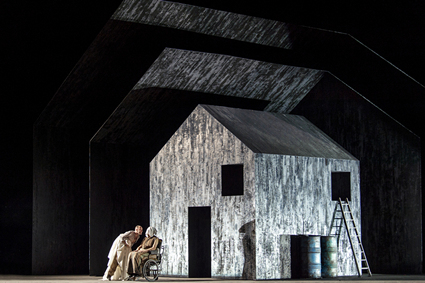| Opera Reviews | 8 May 2024 |
Kurtág's only opera is finally premiered in Milanby Silvia Luraghi |
|
| Kurtág: Fin de partie Teatro alla Scala, Milan 20 November 2018 |
|

Leigh Melrose (Clov), Frode Olsen (Hamm)
|
|
|
After having repeatedly appeared and disappeared from the season’s schedule over the last few years, György Kurtág’s long awaited opera Fin de partie (Endgame) finally premiered at La Scala a week ago. In spite of his long career, this was the composer’s first opera, dedicated to a theatrical work, Samuel Beckett’s play of the same name, which Kurtág had admired ever since he had the opportunity to attend the Paris premiere in 1957. On the occasion of the world premiere, the composer was honored at the 27th edition of the yearly Festival Milano Musica, which was dedicated to him and featured a number of his works, along with works of other 20th century composers, while the Piccolo Teatro, Milan’s most renowned prose theater, staged Beckett’s play with actor Glauco Mauri as the main protagonist. The rehearsals had been long and complicated, as Kurtág, who is now 92, could not leave Budapest due to poor health.. This forced the musical and the theatrical parts to be rehearsed separately, in Budapest with the composer, and in Amsterdam, where director Pierre Audi took care of the staging. Audi had long been trying to convince Kurtág to write an opera, and his contribution to the production relied on a relationship the two men had been developing over the years. The libretto features little more than half of Beckett’s original text, with few lines, often single words, interpolated by the composer. In addition, Beckett’s 1976 poem Roundelay was added as a prologue, in a musical number featuring an aria sung by the soprano who was later to impersonate Nell. The cuts in the text left out a relevant part of the play, and gave the opera a slightly different, and even more static feel, also considering the length (over two hours without an interval). In Beckett’s play, the action takes place in the interior of Hamm’s house, located on the shore of the sea, while Audi, in collaboration with set and costume designer Christof Hetzer, staged the events outside, with the house in the background, even though the libretto preserves Beckett’s original indication of the interior location. This choice had perhaps the effect of rendering even more claustrophobic a situation in which the protagonists cannot escape from an open space. Also, it was not contradicted by Hamms request, in the second part of the original play, to be driven by Clov along the walls of the room, and open the window to hear the noise of the sea, which had been left out from the libretto. The two garbage bins that hosted Nell and Nagg were located by the outer wall of the house, which appeared in different angles in the various scenes. Light designer Urs Schönebaum contributed to the dim and hopeless atmosphere created by the sets. Kurtág’s score is divided into 14 sections, with the orchestra featuring an unusual large complement of wind instruments and a reduced section of violins. The tempi are loose and slightly monotone, and the vocal score mostly features a declamatory style, with more lyrical passages mostly written for Nell. The singers, who had been prepared personally by the composer, adapted to the demanding score with commitment, even though the results were sometimes not so compelling. Bass-baritone Frode Olsen was Hamm, while baritone Leigh Melrose was his servant Clov. The confrontation between the two occupied much of the opera, but the fact that a large part of the second half of the play had been cut gave relatively more space to the dialogue between Nell (soprano Hilary Summer, who also sang the prologue aria) and Nagg (tenor Leonardo Cortellazzi) and then, after Nell’s death, the further confrontation between Nagg and Hamm. To these two higher voices Kurtág dedicated the more traditional parts of the vocal score, which they both managed to deliver satisfactorily. Conductor Markus Stenz, who is also conducting a round of performances of Richard Strauss’ Elektra in the same theater, took great care in orchestrating and conducting the performance. Reportedly, at opening night there was applause for everyone from an audience which was made up largely of music critics. I saw the third performance, which was equally successful, but suffered from the defection of sizable groups of spectators during the short breaks between numbers. It will take some time for this new title to become part of the operatic repertoire, but watch out for the Amsterdam premiere at De Nationale Opera next March.
|
|
| Text ©
Silvia Luraghi Photo © Ruth Walz |
|







